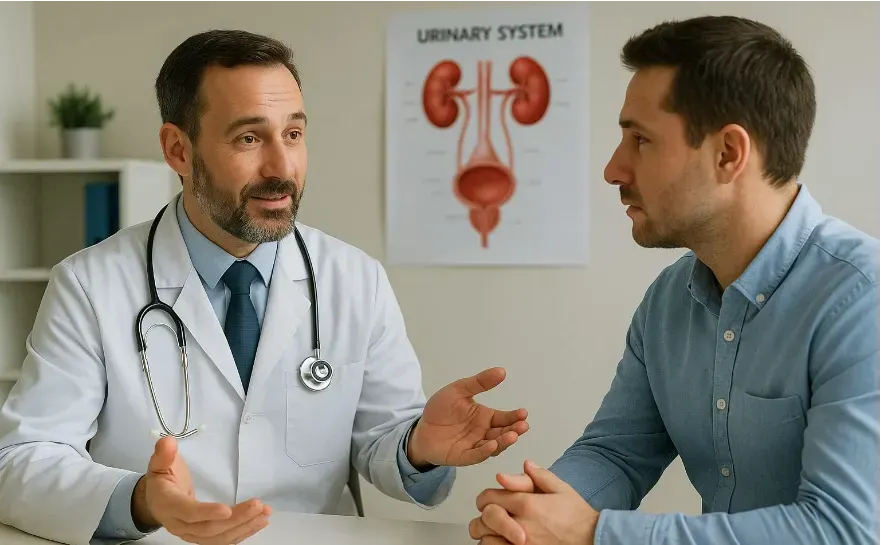Does Stress Cause Prostate Cancer? What We Know and What Really Matters

Key takeaways
- Stress has not been proven to directly cause prostate cancer, but chronic stress may impair immunity and fuel poor health habits.
- Intermittent stress, followed by rest, can actually build resilience and benefit health.
- Patients under stress may struggle with decision-making and are more vulnerable to fear-driven choices.
- Managing stress with exercise, education, support, and recovery is essential during prostate cancer care.
- Prostate health includes emotional well-being—and stress reduction is part of the treatment plan.
The question comes up all the time—especially from men who’ve just received a diagnosis: Did stress cause my prostate cancer? It’s not an idle thought. People often look back on periods of intense life stress—divorce, job loss, grief—and wonder if there’s a link. And while science doesn’t give us a definitive “yes,” it doesn’t entirely rule it out either.
What’s clear is that stress plays a role in how we feel, how we function, and how we make decisions when facing illness. Whether or not it directly causes prostate cancer, chronic stress absolutely deserves attention. Especially when it’s continuous, unrelenting, and layered with fear.
The stress question: myth, fear, and emotional truth
Ask a patient what was happening in life before their diagnosis, and you’ll often hear a story of emotional upheaval. They felt the connection. And that belief is valid, because stress isn’t just emotional—it’s biological. It shapes immune function, inflammation, hormone balance, and behavior.
The problem is proving it. Stress is hard to quantify, and many studies show conflicting results. That said, there’s no debate that managing stress is a critical part of navigating prostate cancer—regardless of its role in causing it.
Intermittent stress vs. chronic stress: why the difference matters
Not all stress is bad. Some stress—the kind that comes with a challenge followed by rest—can actually make us stronger. Think of it like strength training. Push your limits, rest, and you come back more resilient. This is intermittent stress, and it has a valuable role in health and adaptation.
But chronic stress—the kind that never lets up—is a different beast. When the body is constantly flooded with stress hormones, it doesn't get a chance to repair or reset. Over time, that can weaken immune defenses, wear down systems, and create a breeding ground for inflammation and dysfunction.
Can stress impact prostate cancer risk or progression?
There’s no clear evidence that stress directly causes prostate cancer. But there are plausible reasons to think it could contribute—especially through immune suppression, hormonal imbalance, and chronic inflammation. These internal conditions don’t create cancer on their own, but they might tip the scale for someone already at risk.
There’s also the behavioral piece. Chronic stress often leads to poor sleep, sedentary habits, overeating, drinking, or isolation—all of which are linked to worse health outcomes in general. So, even if stress isn’t the match, it may be the gasoline.
How stress affects behavior, decision-making, and outcomes
Stress doesn’t just affect the body—it hijacks the mind. In a medical setting, that matters. Men who are scared, overwhelmed, and uncertain are less likely to absorb information, ask the right questions, or make balanced decisions. They may jump too quickly into aggressive treatments—or freeze and avoid care altogether.
That’s why education and calm conversation are critical. Once a patient understands their diagnosis and what they’re dealing with, stress tends to ease. They feel grounded, capable, and more willing to participate in decisions—not just react to fear.
Practical strategies for reducing harmful stress in prostate care
Managing stress isn’t a luxury—it’s part of the care plan. There’s no single solution, but several strategies can be woven into daily life:
- Exercise: Movement, especially resistance training, reduces stress hormones and builds strength.
- Education: Knowing what to expect helps eliminate the unknowns that fuel anxiety.
- Therapy and support: Whether with a counselor, loved one, or support group, talking helps.
- Mind-body practices: Meditation, breathing exercises, and mindfulness promote emotional stability.
- Purposeful rest: Build breaks into your life—even when it feels hard. Recovery is as important as action.
Prostate health isn’t just physical—it’s emotional too
Whether or not stress plays a direct role in prostate cancer risk, there’s no question that it influences the experience, decisions, and overall well-being of those living with it. The goal isn’t to eliminate stress altogether—that’s impossible. It’s to prevent it from becoming a constant, corrosive force.
Prostate health means more than PSA scores and biopsies. It means feeling emotionally steady, physically strong, and mentally supported. And in that regard, how we handle stress might matter more than we ever realized.
Citations
https://pmc.ncbi.nlm.nih.gov/articles/PMC7269780/
https://www.jci.org/articles/view/63324
https://www.sciencedirect.com/science/article/pii/S0753332224004931
https://www.frontiersin.org/journals/oncology/articles/10.3389/fonc.2017.00269/full
https://www.masseycancercenter.org/news/living-in-disadvantaged-neighborhoods-may-contribute-to-stress-and-aggressive-prostate-cancer
